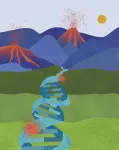(Press-News.org) Four out of five emperor penguin colonies in the Bellingshausen Sea, Antarctica, saw no chicks survive to fledge successfully in the spring of 2022, reports a study published in Communications Earth & Environment. The study suggests that this complete breeding failure is a direct consequence of the unprecedented loss of sea ice recorded in the region in recent years due to climate change.
Emperor penguin (Aptenodytes forsteri) colonies generally need stable ice attached to the land between April and January to ensure successful breeding and moulting. Any change in the extent of the Antarctic sea ice can affect their reproduction as chicks do not develop waterproof feathers until fledging.
Peter Fretwell and colleagues used satellite images covering the period between 2018 and 2022 to monitor the presence of emperor penguins during the breeding season at five colonies in the Bellingshausen Sea in Antarctica. The colonies are known as Rothschild Island, Verdi Inlet, Smyley Island, Bryan Coast, and Pfrogner Point and range in size from around 630 pairs on Rothschild Island to around 3,500 pairs on Smyley Island.
The authors found that four colonies — Verdi Inlet, Smyley Island, Bryant Coast, and Pfrogner Point —experienced total reproductive failure and were abandoned in the period after the sea ice broke up before the start of the fledging period in December 2022. The authors indicate that it is unlikely that any chicks survived to successfully fledge at these colonies. However, satellite images suggest that chicks did fledge successfully at Rothschild Island colony. The authors note that of the five colonies only Bryant Coast colony had been identified as having experienced total breeding failure prior to 2022.
This is the first regional breeding failure of emperor penguins observed in the past 13 years in the region, and among the first evidence of the direct impact of Antarctic warming on the viability of emperor penguin populations.
END
Climate change: Emperor penguin breeding fails due to Antarctic sea ice loss
2023-08-24
ELSE PRESS RELEASES FROM THIS DATE:
Mysterious Neptune dark spot detected from Earth for the first time
2023-08-24
Using ESO’s Very Large Telescope (VLT), astronomers have observed a large dark spot in Neptune’s atmosphere, with an unexpected smaller bright spot adjacent to it. This is the first time a dark spot on the planet has ever been observed with a telescope on Earth. These occasional features in the blue background of Neptune’s atmosphere are a mystery to astronomers, and the new results provide further clues as to their nature and origin.
Large spots are common features in the atmospheres of giant planets, the most famous being Jupiter’s Great Red Spot. On Neptune, a dark spot was first discovered by NASA’s Voyager 2 in ...
Loss of Antarctic sea ice causes catastrophic breeding failure for emperor penguins
2023-08-24
Emperor penguin colonies experienced unprecedented breeding failure in a region of Antarctica where there was total sea ice loss in 2022. The discovery supports predictions that over 90% of emperor penguin colonies will be quasi-extinct by the end of the century, based on current global warming trends.
In a new study published today in Communications Earth & Environment, researchers from British Antarctic Survey discussed the high probability that no chicks had survived from four of the five known emperor penguin colonies in the central and eastern Bellingshausen Sea. The scientists examined ...
Clinical outcomes and overestimation of oxygen saturation in patients hospitalized with COVID-19
2023-08-24
About The Study: Overestimation of oxygen saturation by pulse oximetry led to delayed delivery of COVID-19 therapy and higher probability of readmission regardless of race in this study of 24,000 patients. Black patients were more likely to have unrecognized need for therapy with potential implications for population-level health disparities.
Authors: Tianshi David Wu, M.D., M.H.S., of the Baylor College of Medicine in Houston, is the corresponding author.
To access the embargoed ...
Excess all-cause mortality in China after ending the zero COVID policy
2023-08-24
About The Study: In this study across all regions in mainland China, an estimated 1.87 million excess deaths occurred among individuals 30 years and older during the first two months after the end of China’s zero COVID policy, a proactive strategy that deploys mass testing and strict quarantine measures to stamp out any outbreak before it can spread.
Authors: Hong Xiao, Ph.D., and Joseph M. Unger, Ph.D., M.S., of the Fred Hutchinson Cancer Research Center in Seattle, are the corresponding authors.
To access the embargoed study: Visit our For The Media website at this link https://media.jamanetwork.com/
(doi:10.1001/jamanetworkopen.2023.30877)
Editor’s ...
Assessment of AI chatbot responses to top searched queries about cancer
2023-08-24
About The Study: The findings of this study suggest that artificial intelligence (AI) chatbots generally produce accurate information for the top cancer-related search queries, but the responses are not readily actionable and are written at a college reading level. These limitations suggest that AI chatbots should be used supplementarily and not as a primary source for medical information.
Authors: Abdo E. Kabarriti, M.D., of the State University of New York Downstate Health Sciences University ...
Combining immunotherapy with KRAS inhibitor eliminates advanced KRAS-mutant pancreatic cancer in preclinical models
2023-08-24
HOUSTON ― Researchers at The University of Texas MD Anderson Cancer Center have uncovered a functional role for KRAS mutations in pancreatic cancer and rapidly translated these findings into a novel therapeutic approach combining a KRAS G12D inhibitor with immune checkpoint inhibitors for early- and late-stage KRAS G12D-mutant pancreatic cancer. The combination therapy led to durable tumor elimination and significantly improved survival outcomes in preclinical models, leading to the launch of a Phase I clinical trial.
Two studies, published today in Developmental Cell and Cancer Cell, describe why KRAS-targeted monotherapy likely is not enough ...
Breakthrough in β-lactam synthesis using nickel catalysts
2023-08-24
Led by Director CHANG Sukbok, scientists from the Center for Catalytic Hydrocarbon Functionalizations within the Institute for Basic Science (IBS) have made a significant advancement in the synthesis of β-lactam scaffolds, which are structural components frequently found in essential antibiotics such as penicillins and carbapenems. This breakthrough overcomes challenges in β-lactam synthesis to promise streamlined pathways for drug development.
The core chemical structure that makes up penicillins is a four-membered cyclic amide scaffold called chiral ...
Lignocellulose bio-refinery developed for value-added chemical overproduction in yeast
2023-08-24
Lignocellulosic biomass is a renewable feedstock for 2nd-generation biomanufacturing. In particular, efficient co-fermentation of mixed glucose and xylose in lignocellulosic hydrolysates is a key issue in reducing product costs.
However, co-utilization of xylose and glucose in microbes is challenging due to limited xylose assimilation and the glucose repression effect.
Recently, a research group led by Prof. ZHOU Yongjin from the Dalian Institute of Chemical Physics (DICP) of the Chinese Academy ...
ChatGPT shows limited ability to recommend guidelines-based cancer treatments
2023-08-24
Correct and incorrect recommendations inter-mingled in one-third of the chatbot’s responses, making errors more difficult to detect
For many patients, the internet serves as a powerful tool for self-education on medical topics. With ChatGPT now at patients’ fingertips, researchers from Brigham and Women’s Hospital, a founding member of the Mass General Brigham healthcare system, assessed how consistently the artificial intelligence chatbot provides recommendations for cancer treatment that align with National Comprehensive Cancer Network ...
Topography of the genome influences where cancer mutations thrive, study shows
2023-08-24
Researchers at the University of California San Diego have uncovered a connection between the topography of the human genome and the presence of mutations in human cancer. They found that certain regions of the genome, which exhibit unique features, act as hotspots for the accumulation of mutations.
The findings, published recently in Cell Reports, shed light on how the 3D architecture of the human genome may play a role in the development of various forms of cancer.
The human genome is often visualized as the iconic DNA double helix, composed of long sequences of the letters A, C, G and T. “However, the genome ...




